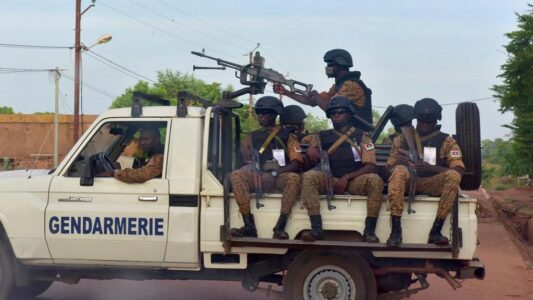
Heavy gunfire, soldiers on the streets in Burkina Faso capital
Soldiers are on the streets and heavy gunfire has been heard near the main military camp and residential areas of Burkina Faso’s capital.
A large blast also rang out on Friday near the presidential palace where soldiers took up positions.
Soldiers were seen along the main avenue leading to the presidential palace, administrative buildings and the national television station, which stopped broadcasting. Journalists said state television instead showed a blank screen saying “no video signal”.
Several main roads in Ouagadougou were blocked by troops. A spokesman for the military government that seized power in January was unreachable.
It was not clear yet if this was a coup attempt, but it bore the hallmarks of other power grabs that have swept across West and Central Africa over the past two years.
Reporting from Saint Louis in Senegal in West Africa, Al Jazeera’s Nicolas Haque said there was a sense of panic across the capital.
“All the streets leading to the presidential palace, the parliament, and the constitutional court are being manned by soldiers. People who have tried to approach these areas have been told to return and move away,” he said.
No public announcement about the motivation behind the troop movements in Ouagadougou was given.
‘A lot of confusion’
Violence has raged in Burkina Faso since Lieutenant Colonel Paul-Henri Sandaogo Damiba seized power in a coup in January, toppling the West African country’s elected leader.
“Late at night, around 3am, gunfire erupted in the capital as the president of transition, who took over in January, was in the presidential palace. There is no word about him nor his whereabouts,” said Haque.
“There is a lot of confusion about who is in charge and who is behind what we are seeing in Ouagadougou.”
In his first statement after the January coup, Damiba, often seen in public in military fatigues and aviator sunglasses, pledged to restore security.
More than 40 percent of Burkina Faso, a former French colony, is now outside government control. In recent years, violence by armed groups has spilled over into the Ivory Coast and Togo.
The military takeover was largely celebrated by civilians fed up with former President Roch Kabore’s civilian government that was unable to rein in fighters who have killed thousands of civilians in recent years and taken over large parts of the north and east.
But attacks in the impoverished West African country have worsened and the army is in disarray. The rank and file, which gave Damiba their support in January, have grown frustrated at the lack of progress, security sources say.
Friday’s developments come two days after Burkina Faso’s government said at least 11 soldiers were killed and 50 civilians were missing after fighters attacked a 150-vehicle military-escorted convoy taking supplies to a northern town.
In a statement on Tuesday, the government said the assault took place on Monday in the commune of Gaskinde in Soum province, where armed groups linked to al-Qaeda and ISIL (ISIS) have escalated attacks and seized territory since 2015.
As in neighbouring countries, fighters affiliated with al-Qaeda and ISIL have stoked the unrest, even after Damiba earlier this month sacked his defence minister and assumed the role himself.
Fighters have blockaded areas of the north, leaving communities stranded. Government convoys and air drops deliver essential goods to trapped civilians.
Much of the country became ungovernable since 2018. Millions have fled their homes, fearing further raids by gunmen who frequently descend on rural communities on motorbikes. Thousands have been killed in attacks.
Burkina Faso has become the epicentre of the violence that began in neighbouring Mali in 2012 but which has since spread across the arid expanse of the Sahel region south of the Sahara Desert.
As well as Burkina Faso, Mali, Chad, and Guinea have all seen coups since 2020, raising fears about a backslide towards military rule in a region that has made democratic progress in recent decades.
Source: msn





